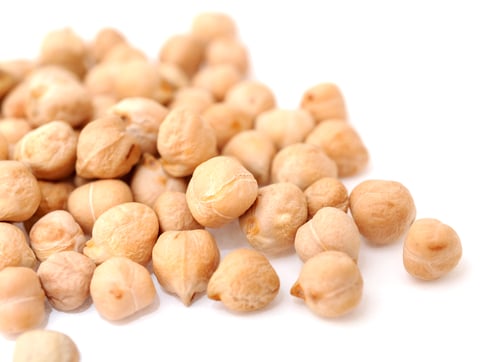
Is Too Much Animal Protein Unhealthy?
In a new study, researchers followed the dietary habits of 6,000 adults over a 20-year period. They found those that ate a diet rich in animal protein during middle-age (age 50 to 64) were more likely to develop diabetes and four times more likely to die of cancer than adults that ate a diet lower in animal protein during mid-life. In addition, they were 74% more likely to die of any cause over the course of the study. Interestingly, eating more protein after the age of 65 didn’t have the same negative effects. There is some evidence that older adults need more protein to prevent the accelerated loss of lean body tissue after the age of 65. Older people who don’t eat enough protein and resistance train are at greater risk for sarcopenia, age-related loss of muscle tissue. It’s sarcopenia that contributes to the frailty and difficulty getting around some people experience at an older age.
It’s hard to draw firm conclusions from a single study. It’s possible that some other lifestyle factor contributed to the higher risk of cancer and diabetes in people who eat lots of animal protein. What this study should do is encourage you to take a closer look at your own diet. Are you getting most of your protein from meat and dairy and too little from plant-based sources? Plant-based proteins have some benefits you don’t get from meat and dairy. Unlike animal protein, they’re higher in fiber and low in saturated fat. Plus, you don’t have to worry about exposure to antibiotics and growth hormone from non-organic meat.
A diet deemed as one of the healthiest in the world – the Mediterranean diet – is low in animal protein. The non-vegetarian protein they get in their diet is mostly fish. Grains, nuts, and legumes are all good sources of plant-based protein. In addition, these foods are rich in antioxidants. For example, a single cup of lentils has 18 grams of protein and lots of heart-healthy fiber to fill you up. Here are some other sources of non-meat protein:
Black beans, boiled (1 cup) 15.0 gm
Chickpeas, boiled (1 cup) 14.5 gm
Quinoa, cooked (1 cup) 11.0 gm
Seitan (4 ounces) 24.0 gm
Tempeh (1/2 cup) 15.5 gm
Tofu, firm (1/2 cup) 20.0 gm
Don’t forget about nuts and seeds. Most contain between 4 and 9 grams of protein per quarter cup. Nuts are also a good source of heart-healthy monounsaturated fats. A number of studies have linked greater nut consumption with lower mortality and a lower risk for cardiovascular disease.
The Problem of “Completeness”
It’s true that most plant-based protein sources aren’t “complete,” meaning they don’t contain all of the essential amino acids your body needs but can’t make – but if you eat a diversity of plant-based proteins you’ll get the full array of amino acids your body needs for health and your muscles need to grow and repair. You don’t have to supply your body with all the essential amino acids at a single meal. As long as you’re getting all the amino acids your body needs in a single day you’re fine.
Some Plant-Based Proteins Are Complete
Soy-based protein sources, including tempeh and tofu, are complete sources of protein. Of the two, tempeh is a better choice because it’s fermented. Fermentation destroys anti-nutrients that reduce mineral absorption and makes soy harder to digest. Although there are a wealth of soy-based foods in packages at most grocery stores, some of them are highly processed with a long list of additives. Unless the package says it’s organic or GMO-free, it likely contains genetically-modified soybeans. Soybeans and soybean oil are one of the most commonly genetically-modified crops.
To avoid eating overly processed soy foods, your best bet is to buy organic tempeh and use it as a meat replacement in some of the dishes where you currently use meat. Tempeh stroganoff can be as tasty as beef stroganoff. Tempeh has a meat-like texture and it takes on the flavor of the sauce you put on it. Marinate it in your choice of sauce and then grill or pan-fry it. Blackened tempeh is another way to enjoy this plant-based source of protein.
Quinoa is another versatile, high-protein “grain” that’s really a seed. Get a jump start on your protein intake by preparing quinoa overnight in a slow cooker instead of oatmeal. Use quinoa as a replacement for rice, use it in salads or in soups to enjoy its fiber and antioxidant-rich benefits. There’s an abundance of recipes showing you how to prepare plant-based protein sources like tempeh and quinoa. Take advantage of them!
The Bottom Line?
Getting adequate protein in your diet is important at all ages – but it’s even more important if you’re over the age of 65 or physically active. Protein helps to build lean body mass when you resistance train and helps support your immune system. Intense athletic training can make you more susceptible to colds and viruses if you don’t consume enough protein. Though you need to make sure you’re getting enough, don’t be afraid to diversify your protein intake by choosing more plant-based protein sources.
References:
Medscape Family Medicine. “Nut Consumption Linked to Lower Mortality”
Science Daily. “Meat and Cheese May Be as Bad for You as Smoking”
Related Articles By Cathe:
What’s the Best Type of Protein for Boosting Muscle Protein Synthesis?
6 Ways Plant-Based Foods Lower Your Risk for Heart Disease
Protein Quality: Not All Proteins Are Created Equal
Is Animal Protein More Effective Than Plant Protein for Building Muscle?
6 Common Protein Myths & Facts That Too Few People Get Right
Are Mushrooms a Good Source of Plant-Based Protein?
4 Reasons Boosting the Protein Content of Your Diet Can Help You Lose Weight
New Study Suggests More Protein is Better for Building Muscle

